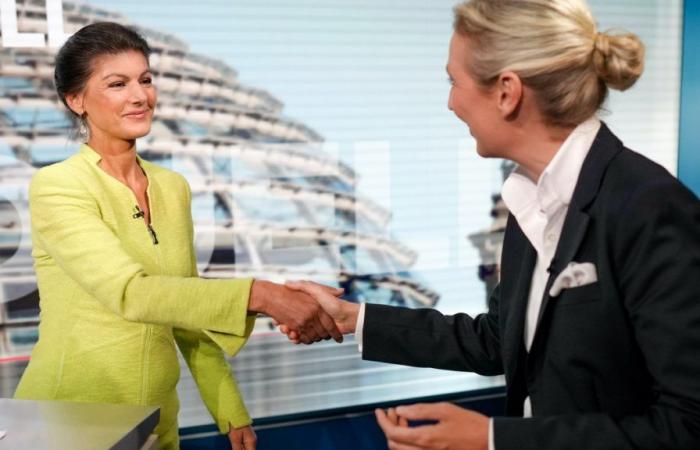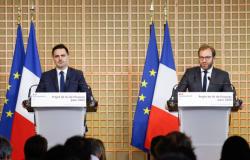The AfD cannot score points in a direct duel: This was shown by the TV dispute between party leader Alice Weidel and BSW founder Sahra Wagenknecht, especially when it came to armaments, economics and social issues – and when dealing with Björn Höcke
It wasn’t enough for a hug in two senses: Sahra Wagenknecht and Alice Weidel at the beginning of their duel on Welt TV
Photo: Kay Nietfeld/Picture Alliance/dpa
“These are AfD positions.” What sounds like an accusation from the liberal center was an attempt at embrace by AfD leader Alice Weidel. Fittingly, the TV duel between her and BSW founder Sahra Wagenknecht did not begin with a hug, but with a handshake. The two politicians met for the first time in a TV duel on Wednesday evening. The TV station invited Weltwhich had already achieved record ratings in April with the duel between the Thuringian top candidates Björn Höcke (AfD) and Mario Voigt (CDU). Reason enough for another duel, this time without any reason.
Wagenknecht versus Weidel. For both of them, this duel is about clarifying their relationship with the other
r another duel, this time without any reason. Wagenknecht versus Weidel. For both of them, this duel is about clarifying their relationship with the other. They both score points primarily with their criticism of the traffic light parties, and the strategic attack on the CDU is also part of their brand core. So the opponents are the same. However, how to deal with the other party has not yet been clarified. Last year, Höcke invited Wagenknecht to become a member of the AfD. In January, AfD party leader Tino Chrupalla signed the peace manifesto by Wagenknecht and Alice Schwarzer. Alice Weidel wants to cut social benefits and lower the capital gains tax. Since the successful founding of the party, criticism has been heard primarily from the AfD: the BSW is Leninist, communist and ultimately too close to the established parties. The BSW is also still working on how to deal with the AfD correctly. You don’t want to form a coalition with her. But the party doesn’t want to follow the course of the established parties: in order to alienate potential voters from the AfD, it expresses sharp criticism of the way it has dealt with the far-right party so far. The two party leaders then went on TV with very different agendas -Duel: For Weidel it was about bringing Wagenknecht back into the camp of political sleazeballs. Because if Wagenknecht, who is capable of governing, represents positions similar to those of the AfD – then there can’t be much wrong with the AfD. This is exactly what Wagenknecht wanted to distance himself from. When it comes to Israel, Weidel and the “Welt” moderator agree. They succeeded on the first topic: Although both want to stimulate the economy again with cheap gas from Russia, both also complain about the poor education in Germany. But when it comes to the fundamental question of how the debt brake should proceed, they clearly contradict each other. Weidel wants more investment, but this can only be achieved through cuts in social benefits. In any case, a reduction in capital gains tax is more important to her than investments. Wagenknecht can score points here right from the start and position itself as a more social and pragmatic party by calling for loan-financed investments in the ailing infrastructure. Even if she doesn’t want to “invite the world to Germany with citizen’s money” – a tight budget cannot be seriously rehabilitated by cutting citizen’s money. Even after that, the ball remains in Wagenknecht’s court. Because Weidel largely agrees with presenter and World TV editor-in-chief Jan Philipp Burgard on Israel’s actions in Gaza and Lebanon – that Israel receives at best too little support from Germany. An easy point for Wagenknecht: Why does the AfD present itself as a peace party when it unconditionally supports Israel in such an approach to war? After some back and forth, Weidel then agrees on at least one point: Israel should actually no longer get weapons from Germany – after all, it needs them itself. Welcome to the self-proclaimed peace party. For Wagenknecht, however, things become critical with the war in Ukraine. As is well known, their positions here are not far from those of the AfD. When she says that Ukraine cannot win this war, Weidel counters: “These are AfD positions that we have been putting forward since the beginning.” Wagenknecht is visibly trying to reject that, only saying that she finds it “a bit cheap now “. Clear demarcation looks different. That’s what Wagenknecht and Weidel said about migration. After a few minutes, when moderator Burgard has tried several times to talk about the upcoming US election, she then remembers what this demarcation should look like: Yes, The AfD is in favor of a diplomatic end to the war in Ukraine, says Wagenknecht. Apart from that, she is in favor of more rearmament. Burgard laconically objects that they “found a small difference.” The fact that the difference of hundreds of billions of upgrades is small may sound cynical, but it could be true. Because the distinction from the AfD is unlikely to be central to most potential BSW voters when it comes to the Ukraine war. The long-standing rigidity of the political center to disqualify all demands for a diplomatic solution to the war has hardly received any response from the population: a majority has wanted more diplomatic efforts from the federal government since the beginning of the war. With the Ukrainian army’s lack of success, this majority has grown even larger. The situation is likely to be different when it comes to migration. Here it is particularly important for Wagenknecht to differentiate himself from the AfD. As Steffen Mau, Linus Westheuser and Thomas Lux showed in their extensive study of trigger points, only a small part of the population supports radical positions on this issue. A majority, however, supports migration within borders. For Wagenknecht, the duel was an opportunity to present herself to these people as a level-headed alternative to the nationalist AfD. Wagenknecht asked Weidel why she was in favor of expelling Höcke from the party. She took advantage of this opportunity. In typical fashion, Weidel mixed the ethnic demand for remigration with the demand, also known from the center, for highly qualified immigration to benefit the economy. Wagenknecht not only distanced himself clearly (“I get sick when I remigrate.”), but was also able to present himself as the comparatively more humane alternative. They don’t want to deport the well-integrated taxi driver from Syria. Now one may doubt that the AfD wants to deport all taxi drivers. But Wagenknecht’s positioning worked because she used the issue as a springboard to focus on the radicalization of the AfD – and thus presented her strongest argument against Weidel. She accused Weidel of tolerating the ethnic wing around Björn Höcke in the party and of wanting to make them acceptable as a bourgeois figurehead. This is a flawless neo-Nazi – Wagenknecht tried to substantiate this with a list of quotes from books and speeches by Höcke, and she read from the sight, which she almost never does otherwise, to substantiate this: he wants to “remigrate” 20 to 30 million people “. In view of this alternative, Wagenknecht’s positions actually seemed more humane.Alice Weidel owes an answerWeidel answered evasively during her comments on Höcke, defiantly asking how long this would last. Her subsequent attempt to steer the topic towards Wagenknecht’s alleged sympathies for Venezuela and Cuba seemed helpless and unprepared. When Wagenknecht then asks why Weidel supported a party expulsion process by the then AfD federal executive committee against Höcke in 2017 if he was so nice, the AfD chairman couldn’t think of anything else. She smiles at moderator Burgard, who asks her to answer. She just says: “Here it’s not Mr. Höcke, it’s me.” Burgard obviously didn’t want to let the distinction be made so clearly here. Bild had already advertised a “duel of extremes” in advance. It didn’t fit that Wagenknecht repeatedly followed in the tradition of Ludwig Erhard and also denounced the right-wing radicalism of the AfD. So at the end, Burgard asked both politicians to rank the other on a scale of 1 to 10 – Wagenknecht was supposed to rate how right Weidel was, Weidel, in turn, how left Wagenknecht was. The designated AfD candidate for chancellor, however, failed. This attempt to establish an equivalence of positions failed. It was all too clear beforehand that that wasn’t the point. When asked, Wagenknecht described Weidel as “maybe a six, I don’t know.” But the problem is that “the Höckes now dominate the party.” Weidel is just the nice picture at the top. She, the AfD’s designated candidate for chancellor, doesn’t even want to get involved: “I generally have problems with left-right scales.” So the evening, which had begun with a handshake, finally ended with a final attempt The demarcation that Wagenknecht had managed to attack again for a long time. For this attack to succeed, Weidel would have to decide: Does she have a problem with the left-right distinction? Or is Wagenknecht a communist in disguise? Because as the TV duel showed, their attempts to differentiate themselves seem just as helpless as their attempts to hug Wagenknecht.






